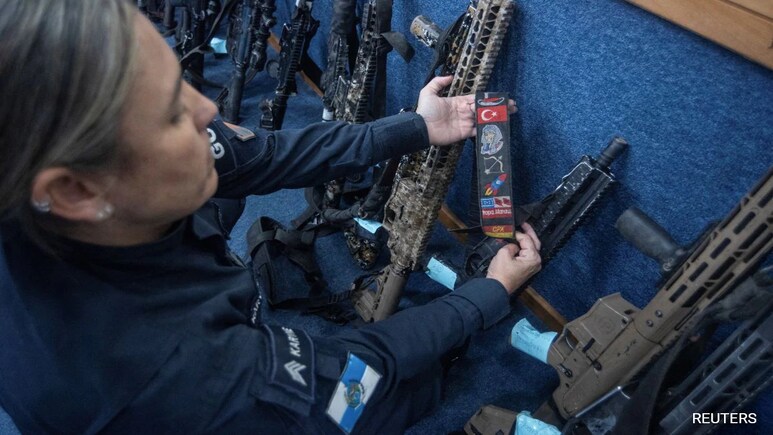
The deadliest police operation in Brazil's history left at least 121 people dead this week in Rio de Janeiro. The raids targeted the Comando Vermelho, or Red Command, one of the country's oldest and most powerful criminal organizations, which dominates the drug trade in several cities.
The violent crackdown comes ahead of the United Nations COP30 climate summit in northern Brazil next week, with Rio hosting the associated C40 global gathering of mayors and the Earthshot Prize awards led by Britain's Prince William.
What Is The Comando Vermelho?
The Comando Vermelho (CV) is one of the biggest and oldest criminal organizations in Brazil, responsible for drug and arms trafficking, as well as violent turf wars with rival gangs.
Its influence has fluctuated over the years amid competition from other criminal organizations, notably the First Capital Command (PCC), Brazil's largest crime syndicate which emerged in Sao Paulo and has built a transnational drug empire.
Despite setbacks, the CV remains central to Rio's drug trade and has been involved in several episodes of extreme violence.
What Are The Comando Vermelho Origins?
The gang traces its roots to the early 1970s, when political prisoners and common criminals formed an alliance inside a maximum-security prison in Rio state during Brazil's military dictatorship.
Political prisoners introduced principles of hierarchy, discipline and mutual solidarity - values that later became the foundation of the gang's organizational structure.
Initially created to protect inmates, the CV began recruiting members from other jails and eventually expanded to the streets of Rio. Today it controls vast swathes of Rio's periphery and favelas by dominating drug sales and imposing its own rules under the threat of violence.
Beyond drug trafficking, the CV is also involved in extortion and robbery within its areas of influence, including the exploitation of some public services such as internet access.
Insight Crime estimates its membership at around 30,000.
Where Has The Gang Spread?
The CV has expanded in recent years into other Brazilian states including those in the Amazon region in pursuit of new drug and arms trafficking routes.
According to authorities, CV leaders from states such as Amazonas, Bahia, Goias, and Espirito Santo were killed by police in this week's operation.
A report this year by the Brazilian Public Security Forum, a think tank, found that crime rates are rising sharply in the Amazon largely due to violent disputes between gangs, including the CV, over control of key routes linking South American cocaine producers to global markets.
Why Did The Police Act?
State police said the raids targeting the gang had been planned exhaustively for more than two months, and were designed to drive suspects from some of Rio's densely populated favelas into a forested hillside, where a special operations unit was waiting in ambush.
Since 2022, the CV has reconquered - through grisly turf wars - neighborhoods of Rio that had fallen into the hands of rival criminal groups. In February, it sealed a truce with the larger PCC, which proved short-lived, lasting just weeks.
The CV competes primarily with the PCC for trafficking routes and prison control, often leading to violent clashes.
It also faces competition from paramilitary groups formed by current and former security agents and local gangs such as the Terceiro Comando, or Third Command.
(Except for the headline, this story has not been edited by NDTV staff and is published from a syndicated feed.)
Track Latest News Live on NDTV.com and get news updates from India and around the world

